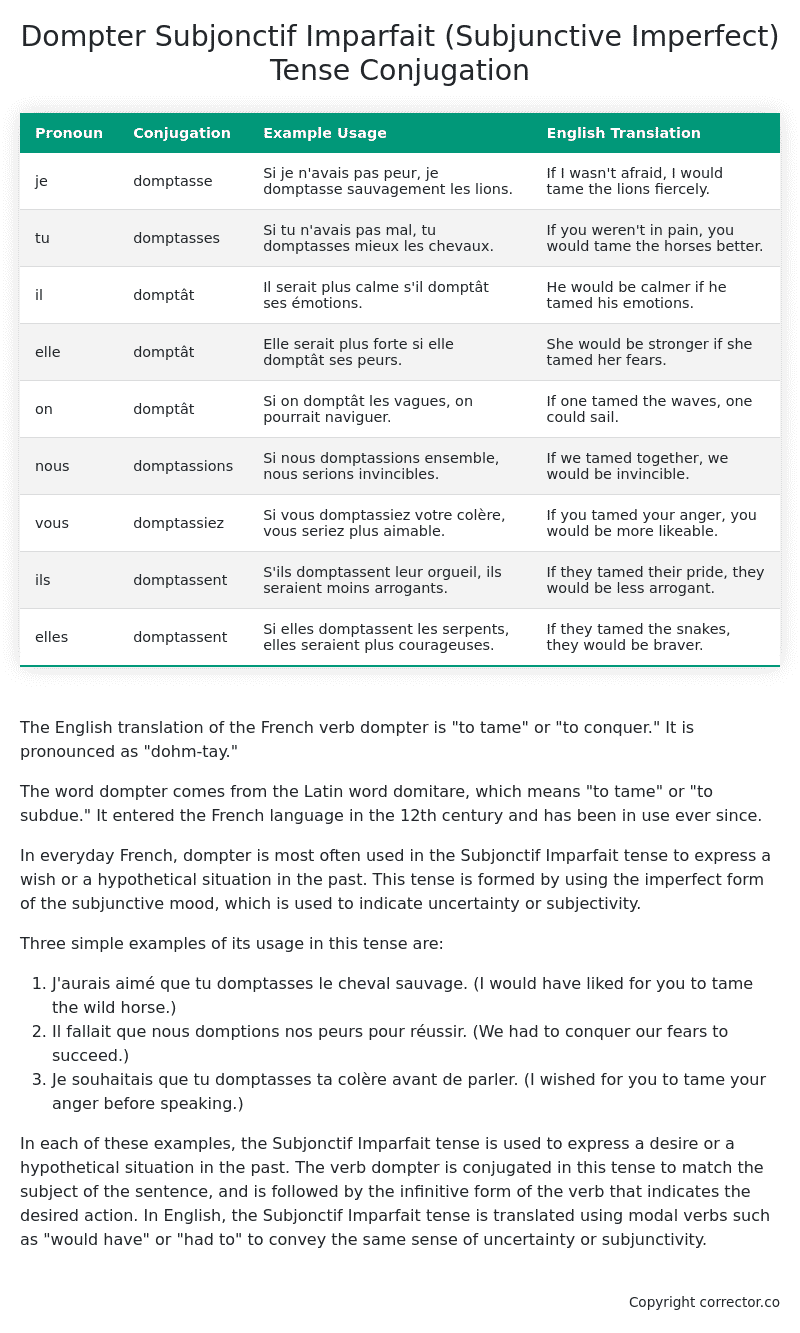Subjonctif Imparfait (Subjunctive Imperfect) Tense Conjugation of the French Verb dompter
Introduction to the verb dompter
The English translation of the French verb dompter is “to tame” or “to conquer.” It is pronounced as “dohm-tay.”
The word dompter comes from the Latin word domitare, which means “to tame” or “to subdue.” It entered the French language in the 12th century and has been in use ever since.
In everyday French, dompter is most often used in the Subjonctif Imparfait tense to express a wish or a hypothetical situation in the past. This tense is formed by using the imperfect form of the subjunctive mood, which is used to indicate uncertainty or subjectivity.
Three simple examples of its usage in this tense are:
- J’aurais aimé que tu domptasses le cheval sauvage. (I would have liked for you to tame the wild horse.)
- Il fallait que nous domptions nos peurs pour réussir. (We had to conquer our fears to succeed.)
- Je souhaitais que tu domptasses ta colère avant de parler. (I wished for you to tame your anger before speaking.)
In each of these examples, the Subjonctif Imparfait tense is used to express a desire or a hypothetical situation in the past. The verb dompter is conjugated in this tense to match the subject of the sentence, and is followed by the infinitive form of the verb that indicates the desired action. In English, the Subjonctif Imparfait tense is translated using modal verbs such as “would have” or “had to” to convey the same sense of uncertainty or subjunctivity.
Table of the Subjonctif Imparfait (Subjunctive Imperfect) Tense Conjugation of dompter
| Pronoun | Conjugation | Example Usage | English Translation |
|---|---|---|---|
| je | domptasse | Si je n’avais pas peur, je domptasse sauvagement les lions. | If I wasn’t afraid, I would tame the lions fiercely. |
| tu | domptasses | Si tu n’avais pas mal, tu domptasses mieux les chevaux. | If you weren’t in pain, you would tame the horses better. |
| il | domptât | Il serait plus calme s’il domptât ses émotions. | He would be calmer if he tamed his emotions. |
| elle | domptât | Elle serait plus forte si elle domptât ses peurs. | She would be stronger if she tamed her fears. |
| on | domptât | Si on domptât les vagues, on pourrait naviguer. | If one tamed the waves, one could sail. |
| nous | domptassions | Si nous domptassions ensemble, nous serions invincibles. | If we tamed together, we would be invincible. |
| vous | domptassiez | Si vous domptassiez votre colère, vous seriez plus aimable. | If you tamed your anger, you would be more likeable. |
| ils | domptassent | S’ils domptassent leur orgueil, ils seraient moins arrogants. | If they tamed their pride, they would be less arrogant. |
| elles | domptassent | Si elles domptassent les serpents, elles seraient plus courageuses. | If they tamed the snakes, they would be braver. |
Other Conjugations for Dompter.
Le Present (Present Tense) Conjugation of the French Verb dompter
Imparfait (Imperfect) Tense Conjugation of the French Verb dompter
Passé Simple (Simple Past) Tense Conjugation of the French Verb dompter
Passé Composé (Present Perfect) Tense Conjugation of the French Verb dompter
Futur Simple (Simple Future) Tense Conjugation of the French Verb dompter
Futur Proche (Near Future) Tense Conjugation of the French Verb dompter
Plus-que-parfait (Pluperfect) Tense Conjugation of the French Verb dompter
Passé Antérieur (Past Anterior) Tense Conjugation of the French Verb dompter
Futur Antérieur (Future Anterior) Tense Conjugation of the French Verb dompter
Subjonctif Présent (Subjunctive Present) Tense Conjugation of the French Verb dompter
Subjonctif Passé (Subjunctive Past) Tense Conjugation of the French Verb dompter
Subjonctif Imparfait (Subjunctive Imperfect) Tense Conjugation of the French Verb dompter (this article)
Subjonctif Plus-que-parfait (Subjunctive Pluperfect) Tense Conjugation of the French Verb dompter
Conditionnel Présent (Conditional Present) Tense Conjugation of the French Verb dompter
Conditionnel Passé (Conditional Past) Tense Conjugation of the French Verb dompter
L’impératif Présent (Imperative Present) Tense Conjugation of the French Verb dompter
L’infinitif Présent (Infinitive Present) Tense Conjugation of the French Verb dompter
Struggling with French verbs or the language in general? Why not use our free French Grammar Checker – no registration required!
Get a FREE Download Study Sheet of this Conjugation 🔥
Simply right click the image below, click “save image” and get your free reference for the dompter Subjonctif Imparfait tense conjugation!

Dompter – About the French Subjonctif Imparfait (Subjunctive Imperfect) Tense
Formation
Common Everyday Usage Patterns
Interactions with Other Tenses
Subjonctif Présent
Indicatif Passé Composé
Conditional
Conditional Perfect
Summary
I hope you enjoyed this article on the verb dompter. Still in a learning mood? Check out another TOTALLY random French verb conjugation!


